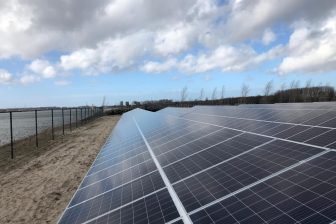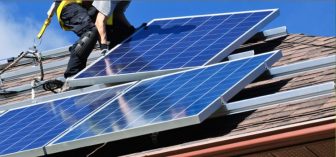Juncker: Europa is in slechte staat, maar doet het goed met CO2-reductie
10 september 2015 – Europa verkeert in slechte staat, zegt voorzitter van de Europese Commissie Jean-Claude Juncker in zijn State of the Union. Maar wat klimaatverandering betreft, zit de EU op het juiste spoor.
Juncker hield gisteren in Straatsburg zijn State of the Union. Logischerwijs lag het zwaartepunt bij de vluchtelingenstroom die Europa binnenkomt en waar de EU volgens Juncker te weinig voor doet.
Uit zijn toespraak
‘(…) It is time to speak frankly about the big issues facing the European Union. Because our European Union is not in a good state. There is not enough Europe in this Union. And there is not enough Union in this Union. We have to change this. And we have to change this now. (…)’
Over de prestaties van Europa in het tegengaan van klimaatverandering was hij wel positief. Europa deed, met het bindende reductiedoel van 40 procent in 2030 (ten opzichte van 1990), de meest ambitieuze bijdrage tot nu toe, benadrukte hij. Maar we zullen niet iedere overeenkomst tekenen, waarschuwt hij de internationale leiders.
Verder verwijst hij naar de overeenkomst die eurocommissaris Cañete van Energie en Klimaat deze week met verschillende eilanden in de Stille Oceaan om duurzame energie en energiebesparing op die eilanden te stimuleren. En naar de conferentie waar volgende maand meer dan vijfduizend burgemeesters bijeenkomen, onder andere om het over klimaatbeleid in hun steden te hebben.
State of the Union, over klimaatverandering
‘(…)
United in Leadership in Addressing Climate Change
One example of where we Europe is already leading is in our action on climate change.
In Europe we all know that climate change is a major global challenge – and we have known for a while now.
The planet we share – its atmosphere and stable climate – cannot cope with the use mankind is making of it.
Some parts of the world have been living beyond their means, creating carbon debt and living on it. As we know from economics and crisis management, living beyond our means is not sustainable behaviour.
Nature will foot us the bill soon enough. In some parts of the world, climate change is changing the sources of conflict – the control over a dam or a lake can be more strategic than an oil refinery.
Climate change is even one the root causes of a new migration phenomenon. Climate refugees will become a new challenge – if we do not act swiftly.
The world will meet in Paris in 90 days to agree on action to meet the target of keeping the global temperature rise below 2 degrees Celsius. The EU is on track and made a clear pledge back in March: a binding, economy-wide emissions reduction target of at least 40% by 2030, compared to 1990 levels. This is the most ambitious contribution presented to date.
Others are following, some only reluctantly.
Let me be very clear to our international partners: the EU will not sign just any deal. My priority, Europe’s priority, is to adopt an ambitious, robust and binding global climate deal.
This is why my Commission and I have been spending part of this first year in drumming support for ambition in Paris. Last May I was in Tokyo where I challenged Prime Minister Abe to work with us in ensuring that Paris is a worthy successor of Kyoto.
In June at the G7 summit, leaders agreed to develop long-term low-carbon strategies and abandon fossil fuels by the end of the century.
Later I met Chinese Premier Li Keqiang to prepare Paris and to launch a partnership to ensure that cities of today are designed to meet the energy and climate needs of tomorrow.
And, in coordination with the High Representative, the members of the College have been engaged in climate diplomacy efforts. Today Commissioner Arias Cañete is in Papua New Guinea discussing the plans for Paris with the leaders of the Pacific Islands Forum. If corrective action is not taken to tackle climate change, the tide will rise and those islands will be the proverbial canary in the coalmine.
However, if Paris delivers, humanity will, for the first time, have an international regime to efficiently combat climate change.
Paris will be the next stop but not the last stop. There is a Road to Paris; but there is also a Road from Paris.
My Commission will work to ensure Europe keeps leading in the fight against climate change. We will practice what we preach.
We have no silver bullet to tackle climate change. But our laws, such as the EU Emissions Trading Scheme, and our actions have allowed us to decrease carbon emissions whilst keeping the economy growing.
Our forward-looking climate policy is also delivering on our much needed Energy Union goals: it is making us a world leader in the renewable energy sector, which today employs over one million people across the EU and generates €130 billion turnover, including €35 billion worth of exports. European companies today hold 40% of all patents for renewable technologies and the pace of technological change increases the potential for new global trade in green technology.
This is why a strategic focus on innovation and on interconnecting our markets is being given in the implementation of the Energy Union.
This is what I promised you last year and this is what this Commission has delivered and will continue to deliver.
The fight against climate change will not be won or lost in diplomatic discussions in Brussels or in Paris. It will be won or lost on the ground and in the cities where most Europeans live, work and use about 80% of all the energy produced in Europe.
That is why I have asked President Schulz to host the Covenant of the Mayors meeting in the Parliament next month, bringing together more than 5,000 European mayors. They have all pledged to meet the EU CO2 reduction objective. I hope that all members of this House will lend their support to the action that communities and localities across Europe are taking to making Paris and its follow up a success. (…)’
Bronnen
Europese Commissie, 9 september 2015: State of the Union 2015: Time for Honesty, Unity and Solidarity
Europese Commissie, 9 september 2015: EU signs sustainable energy declarations with Pacific Islands
Euractiv, 9 september 2015: Juncker: We need more Union in our Union



